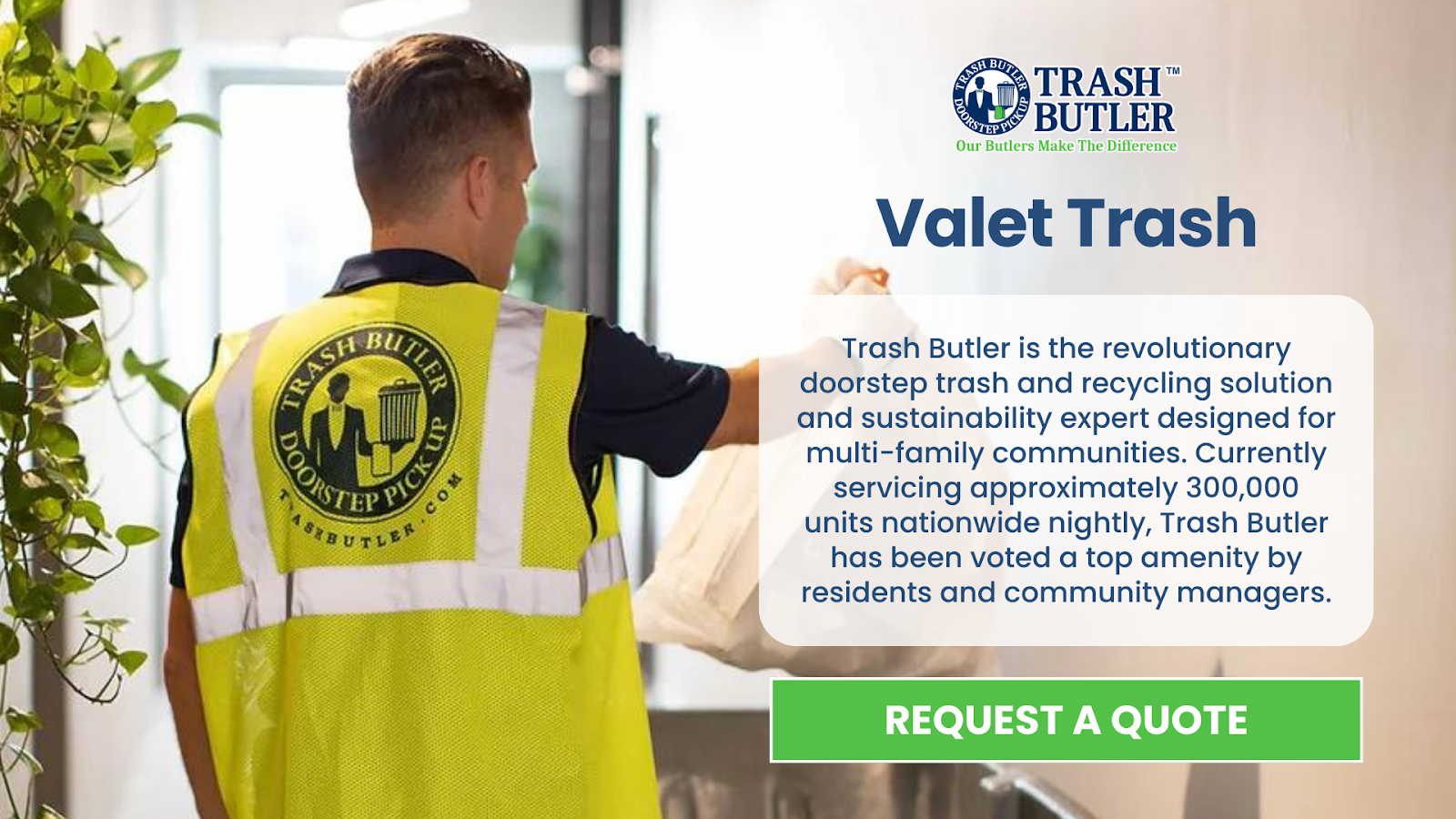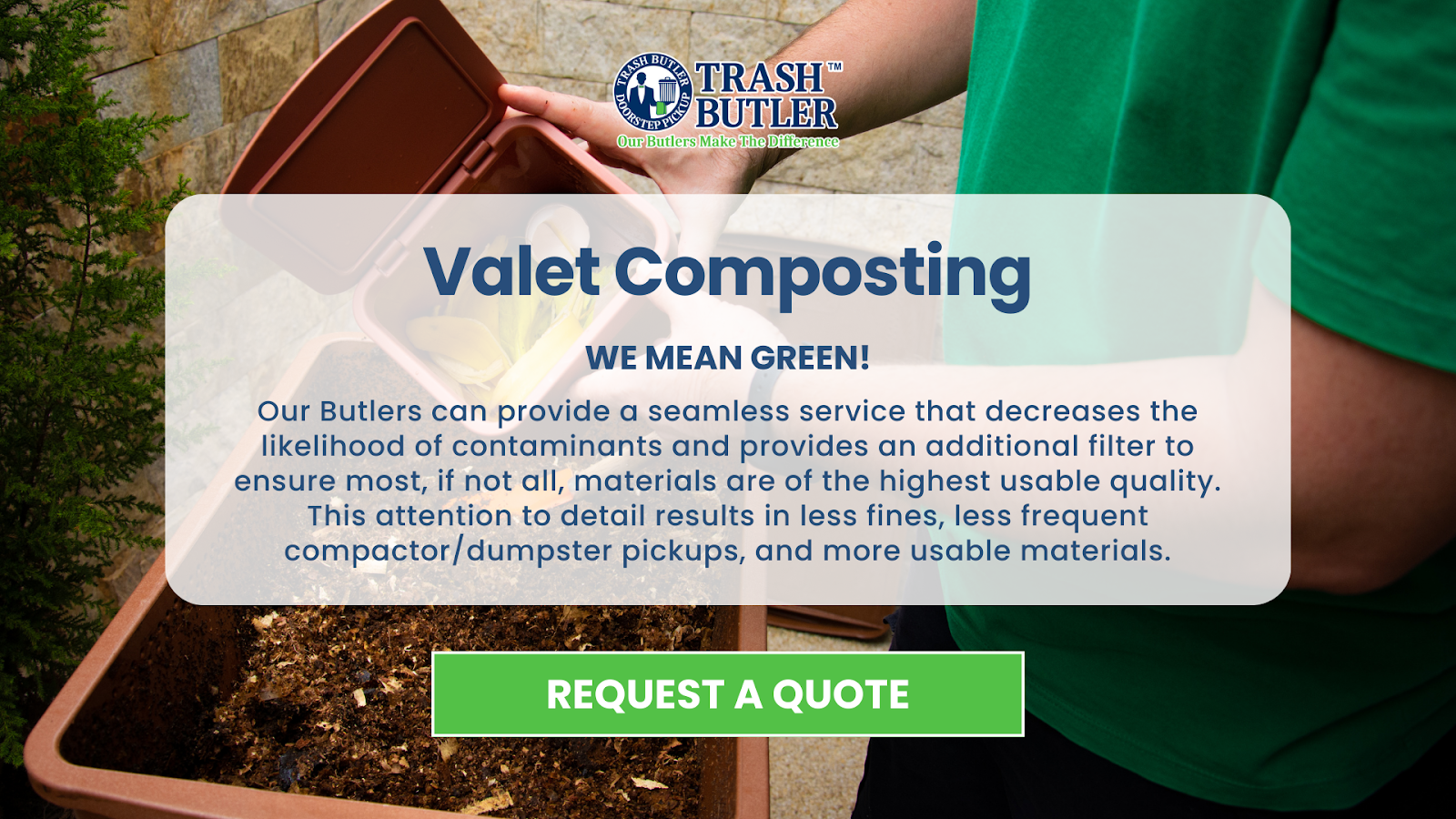Key Takeaways:
- Enhance Property Aesthetics and Operations: Integrating waste services into your property maintenance plan streamlines operations, enhances cleanliness, and improves overall aesthetics.
- Cost Savings and Sustainability: Bundling waste management with other maintenance services reduces costs, improves resource allocation, and supports sustainability efforts.
- Boost Resident Satisfaction: A cohesive waste management strategy promotes cleaner, more convenient living spaces, improving resident experience and retention.
Your landscaping crew finishes trimming hedges, leaving behind mounds of clippings. Your cleaning team meticulously scrubs common areas, only to have overflowing trash cans spoil the freshly cleaned spaces.
This disjointed approach to property maintenance isn’t just inefficient—it creates a cycle of frustration that detracts from your property’s overall appearance, cleanliness, and sustainability. How can you break this cycle and build a more cohesive, streamlined strategy that elevates the entire property experience?
In this article, we’ll discuss why integrating waste services with your property’s other maintenance programs is essential for success. We’ll share practical strategies, the undeniable benefits, and how this approach boosts property aesthetics and enhances operational efficiency.
What Are Waste Services In Property Maintenance?
Waste services in property maintenance refer to the organized processes involved in collecting, disposing, and managing waste generated within a property. This includes residential waste and properly handling recycling, composting, and hazardous materials, ensuring that all waste is disposed of in an environmentally responsible and efficient manner. Waste services are essential to property upkeep because they directly impact the property’s cleanliness, sustainability, and overall appeal.
The Role Of Waste Services In Property Maintenance
Waste services are a vital component of the broader property maintenance framework. They work in tandem with landscaping, cleaning, and other maintenance efforts to ensure the property is functional and aesthetically pleasing. Waste collection and disposal are not isolated tasks; when integrated into the property’s maintenance program, they help create a cleaner, more organized, and well-maintained environment.
Without a well-functioning waste management system, overflowing trash bins, unsightly waste piles, or improper disposal practices can undermine even the best landscaping efforts. Integrating waste services with other property maintenance services helps ensure that these issues are prevented before they arise, supporting the overall cleanliness and appeal of the property.
Why Integrating Waste Services Is Essential For Efficient Property Management
For multi-family apartment communities, managing waste effectively can contribute significantly to the overall maintenance and sustainability goals. Here are a few reasons why integrating waste services is crucial:
- Streamlined Operations: Property managers can ensure that no aspect of community upkeep is overlooked by incorporating waste management into their existing maintenance schedules. This integration allows for a seamless workflow, reducing the likelihood of missed pickups and ensuring that all waste and recycling efforts are executed efficiently.
- Enhanced Resident Experience: Residents value cleanliness and convenience. A reliable waste management service, like Trash Butler™, helps maintain community appeal by ensuring waste is collected and disposed of promptly and responsibly. This improves the living experience, reduces complaints, and improves resident retention.
- Sustainability and Compliance: With a growing emphasis on sustainability, integrating waste services such as recycling programs into property maintenance helps communities meet environmental goals and adhere to local regulations. Proper waste disposal reduces the carbon footprint and demonstrates the community’s commitment to eco-friendly practices.
- Cost-effectiveness: Bundling waste services with other maintenance tasks can save costs. Property managers can make more efficient use of labor and resources by optimizing service schedules and reducing the duplication of efforts, ultimately lowering operational costs.
- Scalability for Growth: As multi-family communities expand, having integrated waste and maintenance services helps manage growth without compromising service quality. This ensures that waste services align with the community’s property maintenance strategy as new units come online, providing a scalable solution catering to the community’s needs.
How To Assess Your Current Waste Services And Property Maintenance Needs
Before integrating waste services with other property maintenance programs, assessing the current systems for waste collection and property upkeep is crucial.
Conduct A Waste Audit:
- Determine Waste Generation: Measure the volume and weight of waste generated over a specific period (e.g., a week) and categorize it (e.g., food scraps, paper, plastic, glass, yard waste).
- Analyze Waste Composition: Identify the types of waste generated and their proportions. Determine the amount of recyclable and compostable materials.
Evaluate Current Practices:
- Assess Current Waste Collection: Evaluate the frequency, efficiency, and effectiveness of current waste collection services. Identify any issues with overflowing bins, missed pickups, or inadequate service.
- Review Existing Maintenance Programs: Analyze the schedules and procedures for other maintenance activities (landscaping, pest control, cleaning). Identify any overlaps, conflicts, or inefficiencies.
- Examine Current Recycling and Composting Programs: Assess the participation rates and effectiveness of existing recycling and composting programs. Identify any barriers to participation or areas for improvement.
Identify Areas For Improvement:
- Waste Reduction Opportunities: Identify opportunities to reduce waste generation through source reduction, reuse, and recycling initiatives.
- Streamlining Operations: Explore ways to streamline waste collection routes and schedules to improve efficiency and reduce costs.
- Integration Opportunities: Identify opportunities to integrate waste collection with other maintenance activities (e.g., coordinating green waste collection with landscaping).
Gather Stakeholder Input:
- Tenant Surveys: Conduct surveys to gather feedback from tenants on their waste management experiences and preferences.
- Staff Input: Obtain input from maintenance staff on the challenges and opportunities related to waste management.
- Vendor Consultation: Consult waste management providers to discuss potential solutions and explore alternative service options.
Set Clear Goals And Objectives:
Define specific, measurable, achievable, relevant, and time-bound (SMART) goals for waste management. For example:
- Increase recycling rates by 20% within six months.
- Reduce waste disposal costs by 10% within one year.
- Implement a composting program within three months.
How To Integrate Waste Services With Other Maintenance Programs
Integrating waste services with other property maintenance programs involves coordinating and streamlining various aspects of property upkeep to create a more efficient, sustainable, and cost-effective system. Here’s a breakdown:
Key Considerations:
- Waste Stream Analysis: Understanding the types and quantities of waste generated on the property is crucial. This includes identifying opportunities for waste reduction, recycling, and composting.
- Coordination with Other Services: Aligning waste collection schedules with landscaping, pest control, or other maintenance activities can optimize routes, reduce vehicle trips, and minimize disruptions.
- Equipment and Infrastructure: Successful integration requires ensuring adequate waste storage, recycling bins, and composting facilities are available and properly maintained.
- Staff Training: Educating maintenance staff on proper waste handling procedures, recycling guidelines, and safety protocols is vital for effective implementation.
- Tenant Engagement: Involving tenants in waste reduction and recycling efforts through education and awareness campaigns can significantly impact the program’s success.
Specific Examples Of Integration:
- Landscaping and Green Waste: Integrating green waste collection with regular landscaping services can streamline operations and reduce the need for separate disposal arrangements.
- Pest Control and Sanitation: Coordinating pest control efforts with regular cleaning and waste removal can help prevent infestations and maintain a hygienic environment.
- Construction and Demolition: Integrating waste management services with construction or renovation projects can ensure proper debris disposal and minimize environmental impact.
Key Challenges Of Managing Waste Services And Property Maintenance Separately
In multi-family apartment communities, separating waste services and property maintenance often results in inefficiencies affecting operational costs and tenant satisfaction. Below are some key challenges associated with managing these services independently:
Inefficient Resource Allocation
When waste services and property maintenance operate in silos, resource allocation can become less efficient. Scheduling conflicts may arise, leading to overlapping work that strains staff resources and increases payroll expenses. By integrating these services, communities can streamline schedules and optimize the deployment of human and material resources.
Inconsistent Service Quality
Maintaining a consistent level of service across different functions can be challenging when waste services and property maintenance are handled separately. Communication gaps between teams may lead to delayed responses to issues such as overflowing trash areas or neglected communal spaces. Such scenarios can detract from the overall resident experience and potentially impact retention rates.
Increased Operational Costs
Operating waste management and property maintenance as distinct functions often lead to duplicated efforts and increased costs. Separate contracts, equipment, and personnel can mean higher expenditures that could otherwise be consolidated. Integrating these services helps negotiate better terms with service providers and maximize operational efficiencies.
Compliance And Environmental Impact
Waste services involve strict adherence to health, safety, and environmental regulations, which can be challenging when not managed in tandem with property upkeep. Separate management can cause lapses in following these regulations, increasing the risk of potential fines and penalties. By integrating waste services with property maintenance, communities ensure better compliance and contribute positively to sustainability goals.
Resident Satisfaction
Residents expect seamless and punctual service delivery, and any disruption due to separately managed waste and maintenance services can lead to dissatisfaction. Integrated service management facilitates the coordination necessary for proactive issue resolution, enhancing the living experience for residents and making the community more appealing in competitive rental markets.
By acknowledging these challenges, multi-family apartment communities can recognize the value of integrating waste services with property maintenance efforts, enhancing efficiency and service quality.
Best Practices For Integrating Waste Services Into Property Maintenance Plans
Integrating waste services into property maintenance programs requires strategic planning and effective communication to enhance efficiency and sustainability across multi-family apartment communities. By following these best practices, property managers can ensure a seamless incorporation of waste management into their overall maintenance plans:
- Conduct a Comprehensive Needs Assessment: Begin by evaluating your property’s specific waste management needs. This includes understanding the volume and types of waste produced and identifying any unique recycling challenges. A thorough assessment will guide the development of a tailored waste services solution.
- Set Clear Objectives and Performance Metrics: Establish clear goals for waste reduction, recycling rates, and overall efficiency. Define key performance indicators (KPIs) to monitor progress and identify areas for improvement. Regular assessments of these metrics help in maintaining the effectiveness of waste services.
- Enhance Coordination Among Maintenance Teams: Promote collaboration among various maintenance teams to streamline waste collection and recycling processes. Define roles and responsibilities clearly, ensuring everyone is aligned toward the common goal of property sustainability.
- Leverage Technology for Efficient Operations: Utilize technology platforms for scheduling, monitoring, and reporting waste management activities. This ensures timely collections, prevents overflow issues, and provides valuable data for optimizing waste services over time.
- Invest in Staff Training and Resident Education: Empower your maintenance staff with training on waste handling techniques and sustainable practices. Additionally, engaging residents through educational workshops and informative signage encourages community-wide participation in waste reduction initiatives.
- Regularly Review and Adjust Service Agreements: Review your waste service contracts regularly to adapt to property needs or changes in regulations. Establish flexible agreements that allow for modifications in service levels, ensuring they align with your waste reduction goals and cost management strategies.
How To Choose Vendors For Waste Services And Property Maintenance Integration
Selecting the right vendors is crucial for seamlessly integrating waste services within your property maintenance programs. To achieve this, consider the following criteria to ensure both efficiency and sustainability:
- Experience and Expertise: Look for vendors with a proven track record in the multi-family housing sector. Expertise in valet trash services and recycling solutions, like those offered by Trash Butler™, indicates a deep understanding of apartment communities’ unique challenges and requirements.
- Sustainability Commitment: Ensure potential vendors prioritize eco-friendly practices. A vendor focusing on sustainability not only aligns with current environmental standards but also enhances your property’s green footprint, appealing to environmentally conscious residents.
- Flexibility and Customization: It is vital to be able to provide tailored solutions. Vendors should offer customizable services that adapt to your property’s specific needs, whether handling diverse waste streams or integrating with existing maintenance schedules.
- Cost-Effectiveness: Evaluate the cost-benefit ratio. While price is essential, consider the long-term value and savings of efficient waste management and the potential to increase property value and tenant satisfaction.
- Technology and Innovation: Seek vendors who employ cutting-edge technology to streamline operations and communication. Advanced reporting tools and real-time updates are crucial for monitoring performance and making data-driven decisions.
- Strong Communication Skills: Effective communication is key. Vendors need to maintain clear lines of communication with property management teams and residents to ensure smooth operations and quick issue resolution.
Final Thoughts
Integrating waste services with property maintenance is not just about efficiency—it’s about creating a seamless, sustainable, and aesthetically pleasing environment. When waste management works in harmony with landscaping, cleaning, and other maintenance efforts, it ensures that the property is clean, more sustainable, cost-effective, and easier to manage.
By focusing on integration, property managers can elevate the resident experience, reduce operational costs, and align with modern sustainability goals. This cohesive approach benefits both property managers and tenants, creating a more attractive and enjoyable community.
Our expert valet trash service and recycling solutions seamlessly complement your maintenance programs, reducing your communities’ environmental footprint while promoting sustainable living practices among residents.
Request a Quote: Fill out a form to see how Trash Butler™ can benefit your community.
Read also:
- Trash Butler: Award-Winning Valet Trash Service of the Year, Redefining Sustainability and Convenience
- How To Market Valet Trash As A Premium Amenity To Prospective Tenants
- The Top 5 Benefits Of Offering Valet Trash Services To Residents
Frequently Asked Questions About Integrating Waste Services With Other Property Maintenance Programs
What types of waste can be managed through integrated services?
Integrated waste services can handle various waste types, including solid waste, recyclables, organic waste, and hazardous materials. By accommodating diverse waste streams, property managers can ensure comprehensive waste management across their communities.
How does recycling fit into an integrated waste service program?
Recycling is a crucial component of any integrated waste service program. By incorporating recycling solutions, communities reduce environmental impact and foster sustainability. A structured recycling program encourages tenant participation and can save costs through reduced landfill fees.
Can integrated waste services reduce overall property maintenance costs?
Yes, integrated waste services can lead to cost reductions in property maintenance. By streamlining waste processes and optimizing schedules, communities can reduce labor expenses, minimize waste disposal costs, and improve operational efficiencies. These benefits contribute to a more sustainable and cost-effective property management approach.
What are the challenges of integrating waste management with other maintenance tasks?
Challenges may include coordinating maintenance schedules, managing tenant compliance, and ensuring effective communication between service providers and property managers. Additionally, aligning waste management goals with broader property maintenance objectives requires strategic planning and collaboration.
What is the importance of tenant participation in integrated waste programs?
Tenant participation is crucial for the success of integrated waste programs. Engaged tenants can significantly enhance efficiency and sustainability by adhering to waste sorting guidelines and recycling protocols. Encouraging tenant involvement through education and incentives fosters a community culture that prioritizes responsible waste management.
How to measure the success of integrated waste services?
Various metrics, such as waste volume reductions, recycling rate increases, cost savings, and tenant satisfaction, can measure the success of integrated waste services. Reviewing these metrics helps property managers refine waste management strategies and achieve their sustainability objectives.






